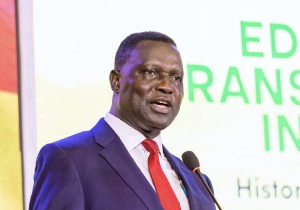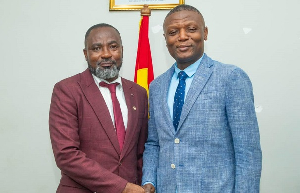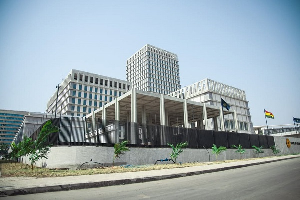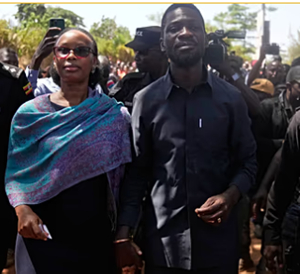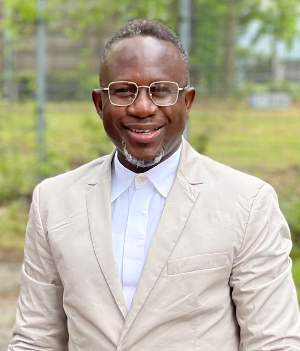Opinions of Monday, 28 October 2013
Columnist: Alexander Anim - Mensah, PhD (ChE)
Cilantro, That Favorite Salsa Ingredient, Purifies Drinking Water
Hints that a favorite ingredient in Mexican, Southeast Asian and other spicy cuisine may be an inexpensive new way of purifying drinking water are on the menu today at the 246th National Meeting & Exposition of the American Chemical Society.
Reporting on research done by undergraduate students at a community college, Douglas Schauer, Ph.D., said that cilantro -- also known as coriander and Thai parsley -- shows promise as a much-needed new "biosorbent" for removing lead and other potentially toxic heavy metals from contaminated water.
"Cilantro may seem too pricey for use in decontaminating large amounts of water for drinking and cooking," Schauer said. "However, cilantro grows wild in vast amounts in countries that have problems with heavy-metal water pollution. It is readily available, inexpensive and shows promise in removing certain metals, such as lead, copper and mercury that can be harmful to human health."
Conventional methods for removing heavy metals from water such as treatment with activated carbon (used in the filters in home water purification pitchers) or more advanced technology like ion-exchange resins are very effective. However, they can be too expensive for use in developing countries, especially in rural areas. The need for lower-cost, sustainable alternatives has fostered research on biosorbents. These natural materials, which range from microbes to plants, latch on to heavy metals in ways that include both absorption and adsorption.
"Our goal is to find biosorbents that people in developing countries could obtain for nothing," Schauer explained. "When the filter in a water purification pitcher needs to be changed, they could go outside, gather a handful of cilantro or some other plant, and presto, there's a new filter ready to purify the water."
Schauer, who is with Ivy Tech Community College here, enlisted his students in that quest, and they worked with scientists at the Universidad Politécnica de Francisco I. Madero in Hidalgo. Mexico does not have a system to filter out heavy metals, said Schauer, noting that cilantro grows wild there. Their small-scale experiments suggested that cilantro may be more effective than activated carbon in removing heavy metals such as lead.
Cilantro's secret may lie in the structure of the outer walls of the microscopic cells that make up the plant. They have an architecture ideal for sorption of heavy metals. Other plants, including cilantro's cousins, parsley and culantro, have similar features and could potentially work as biosorbents, he added. Schauer thinks that biosorbents like cilantro could be packed into tea-bag-like packets, reusable water filter cartridges or even tea infuser balls and used to remove heavy metals.
Schauer and his team cited a grant through the Lilly Foundation for instrumentation and a Perkins grant in support of the Chemical Technology and Biotechnology Programs, also used for instrumentation. Six students traveled to the University in Mexico to collect and investigate samples. Funding for this was provided largely by the Louis Stokes Alliances for Minority Participation.
The original was article published on Science Daily on September 12, 2013 Cilantro, That Favorite Salsa Ingredient, Purifies Drinking Water
Comments
What I seek to achieve here is to share the above information, break it down as possible and comment on how we as Ghanaians as well as Africans can use the thought process. I believe similar approaches could be applied to solve some of our common pressing problems which we have always thought of or sought for solutions from above or developed nations.
Salsa is a Mexican food which has Cilantro. Cilantro is a plant which has leaves used in the preparation of Salsa. Moreover, Cilantro, also known as Coriander, Chinese parsley or Dhania, has leaves that look like that of carrots and belongs to the plant family known as Apiaceae. In general, ingredients of Mexican foods are somewhat similar to that of Africans; however, most may be different from the way they are prepared.
The above article points out that Cilantro could remove lead, copper, mercury and possibly other heavy metals and toxins from water hence purifying water for our consumption. Also, the article mentioned that other similar plants, including cilantro's cousins, parsley and culantro, could potentially work the same way. I could believe heavy metals may contribute to some of our ill-health and could be a silent killer. In addition, I see ignorance as a great part player.
Heavy metals are abound everywhere and get into our bodies through numerous routes including contaminated water, polluted air, and some food types from some locations in Ghana. In as much as some specific plants could purify or remove some toxins, others are the storage vessels of toxins. This is because different plants have different capacity to take different toxins from the earth in which they are planted (basis for phytoremediation).
In addition, depending on the location of the plant, it will pick most of whatever is available in the soil. Moreover, different plants thrive in different environments. The same plant at different locations could take up different toxins based on what is present in the earth. Note that a plant could have both positive and negative characteristics and it could be based on location.
From the forgoing information, either the body needs to be detoxified of these toxins regularly or whatever getting into our bodies treated sufficiently to prevent exposure to potential hazards or consequences. I believe there are similar plants in our environments which could marvelously provide solutions to some of our emerging problems.
The introduction of new chemicals daily in the name of “development” and our existing or conventional detection technologies/approaches as well as what to test for, presents a huge unknown which is scary to our own existence. Most developed countries could regulate what gets into their lands from other countries and as much provide remedies if the adverse happens. However, in developing countries, it is a melting pot of everything which we rarely regulate, monitor nor provide solutions in the event of adversities.
From the above article, I believe most of the solutions to our problems are around us and we need to research diligently. Some believe slavery and/or colonialism has incapacitated us hence the trend has been set such that we rely on developed countries for solutions.
However, solutions from developed countries might not always fit our innate problems since most were not designed to fit our situations. In a way, slavery and/or colonialism have opened our eyes to other cultures which we have learned from and added to what we have. It is just about how we organize ourselves to move forward. Note that liberation from colonialism meant we were ready to take charge.
I believe our forefathers knew all these techniques and much more therefore; today’s responsibilities are to refine and improve on them to meet our needs. However, most information was kept as secrets, undocumented or poorly documented because of fear of copying to threaten their trade and livelihood. In addition, some could not write but presented information orally.
Even today, important information which needs to be protected, documented, made accessible for advancement of the future generations are still kept secret and orally inherited with missing details. In addition, we are constantly moving away from applying what is available in our environments to meet our needs.
Thanks to Mampong-Akuapem Centre for Research into Plant Medicine, Agrata Natural Heath Center, and others who are looking into ways to better lives in Ghana. Thanks to those who are genuinely looking into ways to improve the lives of others while planning to make Ghana comfortable to live. There are much more we can tap from around us to improve lives and our living standards.
Another part of the solution is investing and protecting ideas from inception until fully blown; how to make this information available for application, future improvement and refinement. In our schools, copying is the order of the day; in my view, our training does not promote or reflect developing original ideas. Our programs are so designed to answer questions that are not very innate to Ghana. It appears abominable to challenge some of the solutions presented in some of the foreign books, which some could be wrong.
Most original ideas are shunned if not coming from a renowned person, academician or a student with theoretical “A”s. Even when you have an original idea there are no avenues for support or to receive funding to develop, protect and improve. On individual basis, often times the person who sponsors any project of this sort tends to own and benefit fully from another’s idea. In these instances, will people be willing to share ideas? I believe we are our own enemies despite the numerous religious teachings to better us.
We can do it, however, it appears that some of our complexities includes scarcity of jobs, low/no job opportunity creation, government controlling the fewer jobs, demands from our immediate and extended families as well as cronies, quick means of making money, high bank interest rates, promoting investment with immediate payback and short term vision which has fleeting benefits like buying and selling, tribal issues and affiliated parties making it difficult when one gets into position with plans of working dedicatedly and/or placing the right people in the right positions.
Moreover, our thoughts and branding of government jobs “aban ajuma” and how the government also present its responsibilities often denotes one should not work to the best of abilities for the government. However, the government is relied upon to provide the entire necessary infrastructure for our advancement and comfort. I believe the government has to empower citizens to be able to take charge while providing necessary directions and controls.
It is the responsibility of the government because of the power invested as well as the control of most of the property of the land. Note that actions and reactions are equal in magnitude however, opposite in direction; this means that what the government does affects the citizens and country, and what the citizens do affect the government and country. Hence, both good and bad governances and citizens immensely affect the nation’s development.
I believe the government being the main employer and control has to change its ways for citizens to change theirs. The government has to set good examples, become transparent and accountable to promote healthy patriotism not biased partisanship. It is by patriotism a nation grows; fade away tribal and partisan issues which are destroying the fabric of the society and development.
More so, the government has to deliver its promises, prioritize, avoid using short term solutions as long term if preventable and clearly communicate to citizens about issues. I believe Ghana will be stronger if we all invest in Ghana, support and promote startup companies, make them profitable and non-party aligned. I believe there should be incentives including tax breaks to support startup private businesses with growing and profitable potential because it is these new businesses that can make the nation grow.
The government needs to support, propagate and fund research and development as well as facilitate engaging local individuals to invest in research. Note that rationing of power in Ghana is a clear indication that the energy sector cannot sustain the current population and businesses hence it is not ready for growth in Ghana.
The radio stations which are the listening ears of the nation need to assist in promoting educational issues rather than the numerous political discussions that unconsciously promote character assassinations and embitterment. Of all, we need to engage in publications, documentations, and make information available and accessible for the future generations. I believe with the pursuit of some of the above will Ghana realized some of its potentials.
God bless.
Comments provided by;
Alexander Anim-Mensah, PhD (ChE)
alexraymonda@yahoo.com
Dayton Ohio


